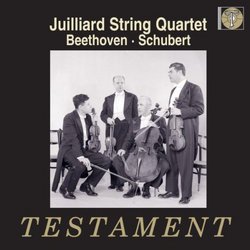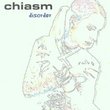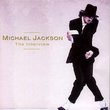| All Artists: Juilliard Quartet, Ludwig van Beethoven, Franz Schubert Title: Juilliard String Quartet Plays Beethoven, Schubert Members Wishing: 1 Total Copies: 0 Label: Testament UK Original Release Date: 1/1/2005 Re-Release Date: 10/11/2005 Album Type: Import Genre: Classical Styles: Chamber Music, Historical Periods, Classical (c.1770-1830) Number of Discs: 1 SwapaCD Credits: 1 UPC: 749677137328 |
Search - Juilliard Quartet, Ludwig van Beethoven, Franz Schubert :: Juilliard String Quartet Plays Beethoven, Schubert
 | Juilliard Quartet, Ludwig van Beethoven, Franz Schubert Juilliard String Quartet Plays Beethoven, Schubert Genre: Classical |
Larger Image |
CD DetailsSimilar CDs
|
CD ReviewsSchubert's "Death in the Maiden" as contemporary music Discophage | France | 09/28/2006 (4 out of 5 stars) "I had long wanted to hear this recording of Schubert's "Death and the Maiden" by the Juilliard Quartet, their first, made in 1959 and paired back then with the "Quartettsatz" (12th quartet), as I had often read laudatory references to it in reviews of subsequent recordings. Testament be thanked for bringing it back, with program notes from Tully Potter which are, as always, a goldmine of erudite information on the ensemble's early years. It was also a nice idea to pair it with Beethoven's opus 131, not only because it affords a CD filled to the brim (over 79') but because these two same-numbered works, among their respective author's last compositions and written two years apart (1824 for Schubert and 1825-6 for Beethoven), finely mirror each other. I will comment only on the Schubert, though, as I am not familiar with Beethoven's quartet and its performance history.
These were the early days of stereo LPs and the Juilliard Quartet, though it had been in activity for over 10 years by then, was not yet a household name, and noted more for its recordings of what was then still contemporary musi -: Bartok and the New Viennese School. It also hadn't yet replaced the venerable Budapest Quartet as Columbia/CBS (now Sony)'s mainstay for sting quartet literature, and made escapades to other labels, such as RCA, as with these two recordings. Of course they later re-recorded the pieces for CBS/Sony - Schubert's quartet in the early 80s, reissued in a convenient 2-CD box with the composer's late quartets also recorded in those years. The opening 1959 Allegro starts auspiciously. Picked up from close up and in rather dry acoustics, but with no saturation, the Juilliards do not develop exceptional power but they are taut, as in the outburst of the D minor chords which open the quartet "with a bang". From the outset they also show a readiness to disregard a too strict adherence to the metronome in favour of a fine theatrical flair, and after an ominous bridge passage, the upward D-A scale leading to the reiteration of the same explosive chords is urgent and tight-fisted. Yet the drawback, I find, is the Juilliard's propensity to play the accordion with tempo in the 1st movement's sonata form, very perceptibly tightening the tempo every time the going gets tough and relaxing it when comes the second, more lyrical and "feminine" theme - an approach that can be traced back at least to the Budapest Quartet's 1955 recording of the same piece (see my comment) and that the Juilliards didn't relinquish in their later recording. It does produce much drama and tension in these tighter moments, but the more relaxed passages veer towards mawkishness, and the constant repetition of that interpretive trick rapidly becomes rather tedious. Likewise, in the 2nd movement (the famous theme and variations) one senses musicians more interested in the effect and dramatic impact of the moment than in the architectural coherence of the whole. The way the Juilliards play the theme is not true to Schubert's "Andante con moto" marking but is quite extraordinary in its own right: they take it at a very slow tempo and with other-wordly pianissimo sonorities that evoke some nightmarish gliding of the Maiden over the black waters of the river Styx. However they make no effort at maintaining that tempo in the ensuing variations, suddenly accelerating for the first variation and imparting it great urgency, with 1st violin Robert Mann displaying an unfailing purity of tone. The second variation continues in the same hurried mood, with a dry cello tone that deprives it of some of its lyricism. Variation 3, which in some versions can sound like Death's demented and headlong race to the abyss, is here not hectic but taut like the sound of the whip and quasi geometrical in its rhythmic precision. I had read somewhere a comment calling this version "abstract" and been puzzled: interpreting Webern may be called abstract - but Schubert? Now I understand what it possibly meant. Similarly, the 4th variation sounds a bit mechanical in its rhythmic precision, but the last one elicits great dramatic power. Again the scherzo doesn't show a great display of power but much rhythmic snap - accents are as dry as the crack of a whip. The Juilliards apply some relaxation of tempo in the middle trio but manage to give it charm while avoiding mawkishness - the innocent young maiden unaware of danger lurking at the window. The Finale, taken with no repeat of the second section, is brisk, urgent, dynamic, with virtuosic precision of attack and great attention to the brutal dynamic contrasts written by Schubert - one of the best I've heard. It might be a cliché to say of the Juilliards that they played modern music like standard repertoire and the classics like new music (as Tully Potter recounts, this was the goal of composer and head of Juilliard School William Schumann when he decided to promote the creation of a resident quartet in 1945), but I find that it is verified here: never to my ears has Schubert sounded so close to Bartok." |




